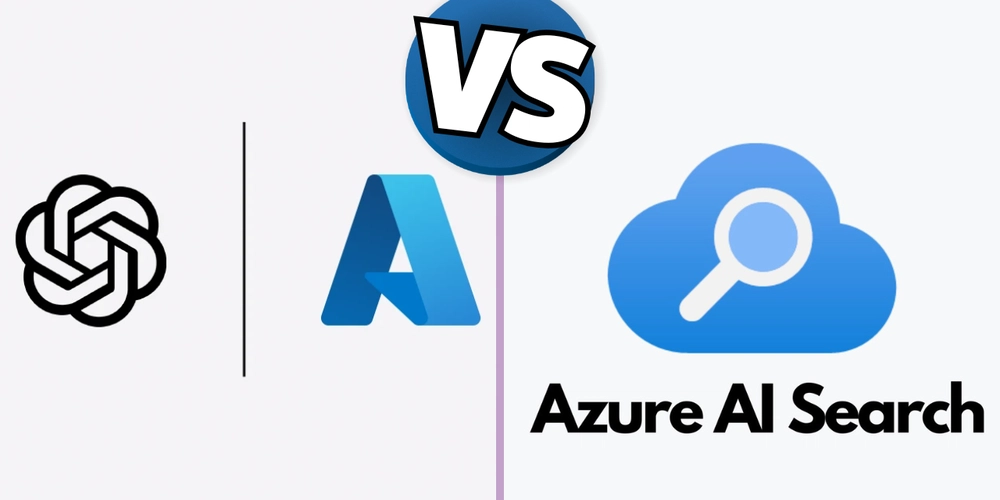As AI tools become more widely adopted, many teams using Microsoft Azure find themselves asking the same question: What’s the difference between Azure OpenAI vs Azure AI Search? Both sound powerful. Both are part of Azure’s AI services. But they serve very different purposes.
If you’re building an AI-driven app, chatbot, or search feature, understanding what each tool does and when to use it can save you time and help you build smarter, faster.
Let’s break it down.
What is Azure OpenAI?
Azure OpenAI Service gives you access to OpenAI’s language models like GPT-4 and GPT-3.5, hosted securely in Azure. These models are designed to understand and generate human-like text, which makes them perfect for tasks like:
- Answering natural language questions
- Writing content or summaries
- Translating text
- Building chatbots or virtual assistants
- Automating emails, responses, or reports
Essentially, Azure OpenAI is all about understanding and generating language. It works well when you want your app to “think” and respond like a human would.
You get the best of OpenAI models (like ChatGPT) but with the security, compliance, and enterprise readiness of Microsoft Azure. You can also fine-tune the models or add content filters for safe, business-friendly outputs.
What Is Azure AI Search?
Azure AI Search (formerly Azure Cognitive Search) is a search-as-a-service solution that helps you build powerful, AI-driven search experiences into your applications or websites. Think of it as adding a mini-Google for your data, which stores internal documents, product catalogs, or databases that you can find later by searching.
Here’s what it does well:
- Indexes your content for fast and accurate searching
- Understands user queries using natural language
- Ranks and filters search results
- Uses AI to extract meaning from unstructured text (with features like semantic search, OCR, and language detection)
It’s perfect for teams that want to make large sets of content easily searchable, whether that’s internal documents, FAQs, e-commerce product data, or knowledge bases.
Key Differences at a Glance
| Feature | Azure OpenAI | Azure AI Search |
|---|---|---|
| Primary Use | Text generation and understanding | Intelligent search engine |
| Main Strength | Natural language responses | Fast, AI-enhanced document search |
| Typical Use Cases | Chatbots, summarization, Q&A | Website search, internal knowledge lookup |
| Works Best With | Unstructured prompts or questions | Structured and unstructured content |
| AI Model | GPT (LLMs) | Built-in NLP, semantic ranking |
When to Use Azure OpenAI
Use Azure OpenAI when your application needs to understand or generate language. It is ideal for automating content tasks, improving productivity tools, or powering human-like interactions in applications. For example:
- Generating product descriptions
- Writing emails or summaries
- Creating personalized content in real-time
When to Use Azure AI Search
Choose Azure AI Search when you want to help users find the right information from large content sets. It supports search functionality similar to web search engines but tailored to business data. Use cases include:
- Employee knowledge portals
- Product catalog searches
- Document search with filters and tags
Can They Work Together?
Yes. Azure OpenAI and Azure AI Search can complement each other in some solutions. For example, a chatbot built with Azure OpenAI can use Azure AI Search to fetch documents or knowledge base articles in response to user queries. Azure AI Search handles the retrieval, and Azure OpenAI helps present the answer in a natural way.
Final Thoughts
Both Azure OpenAI and Azure AI Search offer real value, but they solve different problems.
- Use Azure OpenAI when your focus is conversation, generation, or reasoning.
- Use Azure AI Search when you need to deliver fast, relevant search results over large collections of content.
And when used together, they can help you build AI-powered experiences that are not only smart but also grounded in real, trustworthy information.
If you still need help making the right choice between Azure Open AI vs Azure AI Search, connect with Azure consultants. They can asses your setup, understand your goals and help you make the right choice.

